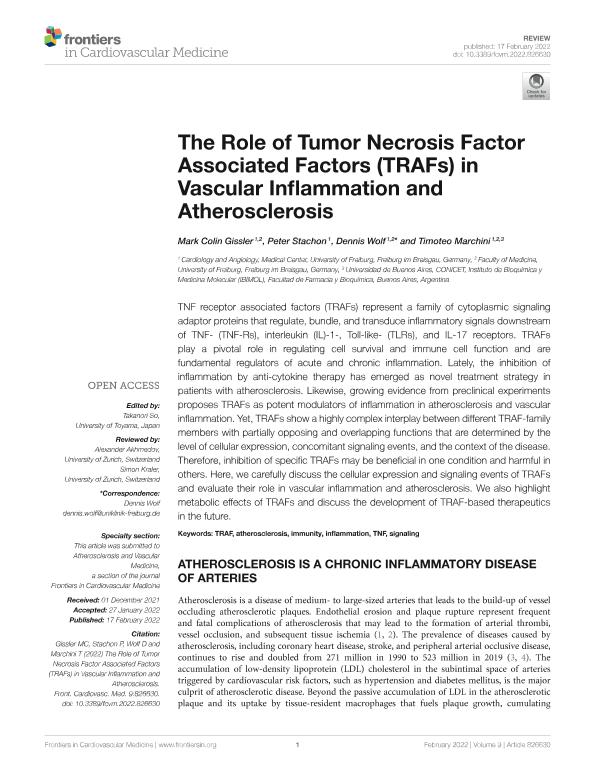Mostrar el registro sencillo del ítem
dc.contributor.author
Gissler, Mark Colin
dc.contributor.author
Stachon, Peter
dc.contributor.author
Wolf, Dennis
dc.contributor.author
Marchini, Timoteo Oscar

dc.date.available
2023-07-19T15:40:56Z
dc.date.issued
2022-02
dc.identifier.citation
Gissler, Mark Colin; Stachon, Peter; Wolf, Dennis; Marchini, Timoteo Oscar; The Role of Tumor Necrosis Factor Associated Factors (TRAFs) in Vascular Inflammation and Atherosclerosis; Frontiers Media S; Frontiers in Cardiovascular Medicine; 9; 826630; 2-2022; 1-17
dc.identifier.uri
http://hdl.handle.net/11336/204466
dc.description.abstract
TNF receptor associated factors (TRAFs) represent a family of cytoplasmic signaling adaptor proteins that regulate, bundle, and transduce inflammatory signals downstream of TNF- (TNF-Rs), interleukin (IL)-1-, Toll-like- (TLRs), and IL-17 receptors. TRAFs play a pivotal role in regulating cell survival and immune cell function and are fundamental regulators of acute and chronic inflammation. Lately, the inhibition of inflammation by anti-cytokine therapy has emerged as novel treatment strategy in patients with atherosclerosis. Likewise, growing evidence from preclinical experiments proposes TRAFs as potent modulators of inflammation in atherosclerosis and vascular inflammation. Yet, TRAFs show a highly complex interplay between different TRAF-family members with partially opposing and overlapping functions that are determined by the level of cellular expression, concomitant signaling events, and the context of the disease. Therefore, inhibition of specific TRAFs may be beneficial in one condition and harmful in others. Here, we carefully discuss the cellular expression and signaling events of TRAFs and evaluate their role in vascular inflammation and atherosclerosis. We also highlight metabolic effects of TRAFs and discuss the development of TRAF-based therapeutics in the future.
dc.format
application/pdf
dc.language.iso
eng
dc.publisher
Frontiers Media S
dc.rights
info:eu-repo/semantics/openAccess
dc.rights.uri
https://creativecommons.org/licenses/by/2.5/ar/
dc.subject
TNF
dc.subject
TRAF
dc.subject
ATHEROSCLEROSIS
dc.subject
IMMUNITY
dc.subject
INFLAMMATION
dc.subject
SIGNALING
dc.subject.classification
Inmunología

dc.subject.classification
Medicina Básica

dc.subject.classification
CIENCIAS MÉDICAS Y DE LA SALUD

dc.title
The Role of Tumor Necrosis Factor Associated Factors (TRAFs) in Vascular Inflammation and Atherosclerosis
dc.type
info:eu-repo/semantics/article
dc.type
info:ar-repo/semantics/artículo
dc.type
info:eu-repo/semantics/publishedVersion
dc.date.updated
2023-07-05T12:23:43Z
dc.identifier.eissn
2297-055X
dc.journal.volume
9
dc.journal.number
826630
dc.journal.pagination
1-17
dc.journal.pais
Suiza

dc.journal.ciudad
Lausanne
dc.description.fil
Fil: Gissler, Mark Colin. Albert Ludwigs University of Freiburg; Alemania
dc.description.fil
Fil: Stachon, Peter. Albert Ludwigs University of Freiburg; Alemania
dc.description.fil
Fil: Wolf, Dennis. Albert Ludwigs University of Freiburg; Alemania
dc.description.fil
Fil: Marchini, Timoteo Oscar. Albert Ludwigs University of Freiburg; Alemania. Consejo Nacional de Investigaciones Científicas y Técnicas. Oficina de Coordinación Administrativa Houssay. Instituto de Bioquímica y Medicina Molecular. Universidad de Buenos Aires. Facultad Medicina. Instituto de Bioquímica y Medicina Molecular; Argentina
dc.journal.title
Frontiers in Cardiovascular Medicine
dc.relation.alternativeid
info:eu-repo/semantics/altIdentifier/url/https://www.frontiersin.org/articles/10.3389/fcvm.2022.826630/full
dc.relation.alternativeid
info:eu-repo/semantics/altIdentifier/doi/http://dx.doi.org/10.3389/fcvm.2022.826630
Archivos asociados
